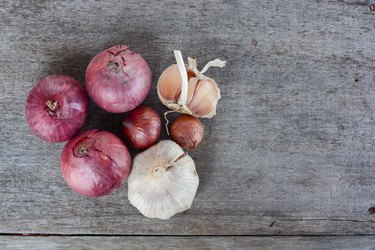
Adding a clove or two of chopped garlic can have a transformative effect on the overall flavor of the dish you're cooking. However, this extra flavor can come with a particularly smelly disadvantage, the result of a chemical compound called allicin, which makes garlic sweat emanate from your pores.
Tip
Garlic is one of the foods that make you smell bad when eating it raw. The organic compound allicin, which is released when fresh garlic is cut or chopped, is broken down into smaller, smellier compounds that are responsible for the garlic sweat odor.
Video of the Day
Garlic Nutrition Facts
According to the USDA, a single clove of garlic provides approximately 4 calories of energy, where 81 percent comes from carbs, 15 percent from protein, and 3 percent from the fat. Garlic also contains iron, sodium and magnesium, minerals that help the body maintain the proper functioning of its muscles and circulatory system.
Video of the Day
Garlic is particularly rich in minerals like calcium and potassium, which are required by the body's skeletal system and for muscle contraction. A clove of garlic also offers 0.9 milligrams, or 1 percent of the daily value, of vitamin C, an important vitamin that's not produced by the body but instead obtained from food sources. It helps the body heal wounds and make collagen, aiding in the elasticity of the skin.
Read more: 10 Incredible Garlic Hacks
Black garlic, which is made by fermenting fresh garlic pods in a temperature-controlled environment, is milder and lower in allicin, the chemical compound responsible for garlic's pungency and smell. Fermentation, however, decreases the carbohydrate content of black garlic, when compared to fresh garlic.
Garlic Health Benefits
According to the Linus Pauling Institute Micronutrient Information Center, the benefits of garlic lie in its organic compound allicin, the same compound responsible for the odorous smell of garlic sweat. Allicin contributes to garlic's antioxidant, anti-inflammatory and cardiovascular protection properties.
Read more: Benefits of Garlic Oil Capsules
However, the benefits are only seen in raw garlic. Cooking or heating garlic can lead to the destruction of the enzyme alliinase, which is responsible for the production of allicin, and for making garlic one of the foods that make you smell bad.
In fact, results from an October, 2019, study published in Molecules show that garlic also exhibits antifungal properties. The main compound in garlic extract, allicin, may have a positive effect on treating fungal infections of the nails. It also works in a similar manner when it comes to bacteria.
According to a September 2019 study published in the International Journal of Medical Microbiology, allicin was able to exhibit antimicrobial properties by inhibiting the production of an enzyme, DNA gyrase, that helps bacterial cell proliferation in E. coli bacteria. However, large-scale human trials need to be conducted to test the antimicrobial effect of garlic on bacteria.
The Science Behind Garlic’s Smell
When raw garlic is peeled and chopped, it releases the chemical compound allicin. This compound is then broken down into four smellier compounds, with allyl methyl sulfide being the main one — the other three are diallyl disulfide, allyl mercaptan and allyl methyl disulfide — responsible for the notorious
Unfortunately, although garlic is delicious, it is one of those foods that make you smell bad after eating it. Michigan State University Extension explains that the oils present in garlic end up in the tissues of the lungs, affecting not just your breath but also the garlic smell from pores emanating as garlic sweat.
According to an October 2016 study in the Journal of Food Science, researchers found that eating either an apple, lettuce or mint helps to decrease the smell of garlic. It is likely the phenolic compounds present in these foods that are responsible for reacting with, and deodorizing, the smelly sulfide compounds.
- MyFoodData.com: “Nutrition Facts for Garlic”
- Linus Pauling Institute Micronutrient Information Center: “Garlic”
- Molecules: "Allium sativum Extract Chemical Composition, Antioxidant Activity and Antifungal Effect against Meyerozyma guilliermondii and Rhodotorula mucilaginosa Causing Onychomycosis”
- International Journal of Medical Microbiology: "Allicin, a Natural Antimicrobial Defence Substance From Garlic, Inhibits DNA Gyrase Activity in Bacteria”
- Michigan State University Extension: "Stinking Facts About Garlic"
- Journal of Food Science: "Deodorization of Garlic Breath by Foods, and the Role of Polyphenol Oxidase and Phenolic Compounds"
- Texas A&M AgriLife Research: "Science Of Stink: Blame Sulfur Compounds For Your Garlic Breath"